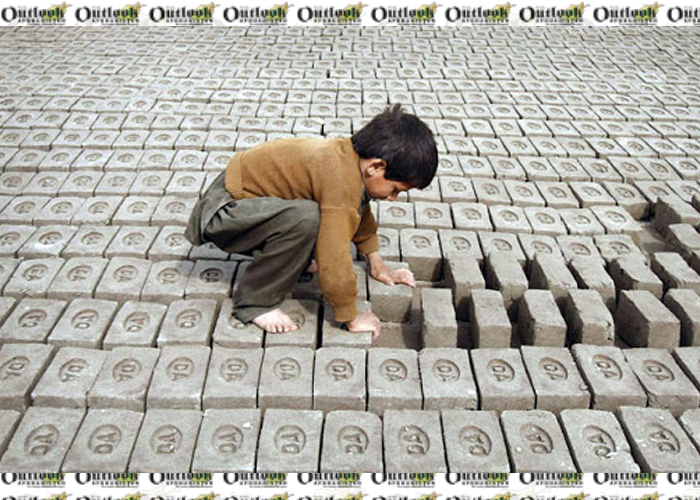June 12 as World Day against Child Labor has marked in national and international level. At the national level, it is said that there are about 6 million child laborers while they are also at risk of war, violence, and virus. At the international level, according to the latest report released by the ILO and Unicef, child labor has soared to 160 million worldwide. Child labor not only harms the physical and mental development of children but also deprives them of their childhood joys and happy life in the future. Therefore, millions of children are suffering from labor worldwide while the majority of them pertaining to the poor and war-torn countries such as Afghanistan.
The bad news in Afghanistan is that Afghan children are not only exploited by economic firms but also by terrorist groups and intelligence networks. It means, Afghan children in Afghanistan exceptionally endure some of the worst forms of child labor from being recruited into the armed conflict, to the production of bricks and carpets, as well as in agriculture, mines, and most visibly on the streets as beggars, shoe shiners and porters/vendors, but the issues of exploiting into the armed conflict are very wide and destructive as thousands of children are misused in one way or another. First, they are brainwashed and then give training on the handling of weapons and finally sent to war and launching suicide attacks. Even, small children are misused that are not older than six or seven years. This way, the children are deliberately abused or killed in Afghanistan. As a recent example, at least 90 children were collectively killed and 240 others wounded in Sayeed Al Shohda School, west of Kabul.
According to the Afghanistan Independent Human Rights Commission, at least 109 children lost lives in only one month in the current relentless violence. However, the challenges of children are not confined to war and violence in Afghanistan. As abovementioned, there are different interrelated reasons behind the critical condition such as poverty, drought, addiction, displacement, covid-19, orphanage, but after the intensification of war and violence in recent months and years, millions of children have lost their parents while they receive no social allowance from the government. In fact, the orphanage is a direct consequence of the armed conflict which ravaged the country. Therefore, they have no option but to engage in hard work even at the early ages of six or seven to earn a minimum income to survive. In some cases, their parents are maimed or addicted, forcing their children to hard work.
The next common factor behind the critical condition of children is psychological and family violence in Afghanistan. According to UNICEF, 70% of Afghan children are faced with family violence. As the government itself is caught in political issues or corruption, there is no transparent process to investigate the violence or crimes committing against children. The Afghan children are not only deprived of education and engaged in hard-working but also scrambling with a lot of social, mental, and family problems. They are being abused in a variety of ways. To prevail the problems, the government and human rights watchdogs should implement a humanitarian process that could rescue the children from hard-working, and help them in several ways.
The other major factor behind the critical condition of children is growing poverty. Nonetheless, the high rates of poverty also linked to other abovementioned factors such as insecurity, displacement, and natural disasters mean sending school-age children out to work is often essential to the survival of families, placing children across Afghanistan at significant risk. Many social anomalies, such as theft, killing, suicide, social harassment, divorce, and ethical deviation result from growing poverty. Thus, a variety of diseases and mental illnesses are also appearing due to chorionic food insecurity and mental discomfort. In general, the death rates of women and children cannot be analyzed separated from the security, political and economic factors. therefore, the interrelated conditions of the society will not improve as long as there is no positive change in the general political and economic condition of the country.
The last major and emerging problem that plays a major role in worsening the condition of children is the third wave of covid-19 in the country. Although the issue of covid-19 is a global phenomenon affecting everyone in the world, weak countries such as Afghanistan are faced with its deeper implications. With emerging the third wave of covid-19, the food prices, especially those foods and fruits which are recognized as sources of vitamin C are unstoppably increasing in the country while according to the United Nations Office for the Coordination of Humanitarian Affairs (OCHA), half the Afghan population had already been in need of humanitarian support, with 90 percent of Afghans living below the poverty line (less than USD 2 a day).
Therefore, the third wave of covid-19 combined with other aforementioned factors will likely increase child labor in Afghanistan. If the international community does not help with vaccine and fiscal packages, and if the government is failed to control the growing prices, we should expect a severe human tragedy in Afghanistan. To overcome the growing challenges of children, the shortest way is to draw the attention of humanitarian organizations about painful conditions of children, but in longer-term, there is no easy way other than reaching peace and security, reduction of poverty, control of birthrate, giving social allowances to a certain group of children such as orphans, illegalizing the hard work, bringing flexibilities in educational programs such as opening night schools, providing enough health services, and finally raise awareness about the implications of hard work on physical, mental and social growth of children in the country.
Home » Opinion » World Day Against Child Labour Marks Under Shadow of War and Virus in Afghanistan
World Day Against Child Labour Marks Under Shadow of War and Virus in Afghanistan
| Mohammad Zahir Akbari

